- Home
- Muriel Spark
The Finishing School Page 2
The Finishing School Read online
Page 2
3
The next night about nine o’clock Rowland and Chris went along to the mysterious house of the violin. They found the gate open, the vestibule light on, but the front of the house in darkness. On the front door was a well-shined brass plate: “Dr. Israel Brown.” Round the back of the house, which they approached carefully in the dark, there was equally no sign of an inhabitant. But a torchlight shone in the darkness on the pathway to the back door and French window. A man shaped himself forth, holding the torch. He was elderly and walked with a stoop, evidently a guardian or gardener of the house. “Looking for someone?” he said in his singsong Vaudois.
“We come from College Sunrise,” said Rowland. “I understand there is a violin player in this house. I am looking for a violin teacher.”
The man laughed. “Giovanna plays the violin,” he said. “She doesn’t need a job.”
“Who is Giovanna?” said Chris.
“Giovanna Brown, Dr. Brown’s aunt, believe it or not, although she is ten years his junior. It’s one of those things that occur sometimes in families.”
“I believe I heard her play,” said Chris. “I happened to be passing. A couple of times.”
“Ah.”
“Are they away?” said Rowland.
“Yes, they’ve left. If you want to leave a message there’s a maid comes in the mornings.”
“No message,” said Rowland, “just a courtesy call.”
Chris said, on the way back, “Obviously she’s a cripple or had an accident which induced her to sit at the window all day, so she played a joke on me when I passed by the house.”
“How you romance about things.”
“No, it’s a perfectly logical supposition.”
Which it was, for the young aunt of Israel Brown had suffered a broken shin at an ice-hockey stadium in Vienna, where she was studying music. She had been flown to her nephew’s house at Lausanne to recover. Sure enough, she had amused herself by playing a few bars on her violin at the window where she sat daily with her leg up, as Chris, a red-haired target, was passing.
Neither Chris nor Rowland, however, was yet aware of this actual construction of events. Rowland said, “Have you been taking anything?”
“No,” said Chris. “I don’t smoke or sniff while I’m writing. In fact, practically never.”
The choking sensation attacked Rowland again. “I think you’re working too hard and too long hours on that novel. Why don’t you talk to Nina. She’s very helpful.”
“I know.” Chris added, “I didn’t imagine the violin.”
“But if you did,” said Rowland, “it wouldn’t be your fault.”
Chris laughed. Then he said, “Rowland, you don’t like my novel, but I’m going to write it.”
They had reached College Sunrise and let themselves in. Pallas Kapelas, tall and swarthy and striking, was in the hall.
“My father,” she said, “has lost his cards.”
“What cards?” said Rowland.
George Kapelas, Pallas’s father, had recently stayed overnight at College Sunrise.
“His card index. He belongs to the card index generation. I have to send him my address book. I’ll get it back.”
Chris started up the stairs to his room. Pallas followed. She looked over her shoulder. Rowland was watching them—why? Not really intending to wave a red rag in front of a bull, she called down, as she mounted, “Getting on with your novel, Rowland?” All the students of Sunrise knew that he struggled with a novel. They often volunteered to give him ideas for it; which he accepted politely enough. They begged him to read it aloud to them, but the truth was, the book was not yet in any readable condition. It consisted of paragraphs here and there on his computer, changing from day to day. He was in a muddle, which was not to say he would not eventually get out of it, as in fact he was to do by writing a different sort of book. Rowland, late that night, got out of bed. Nina woke. But he didn’t make for the bathroom as Nina expected. He was now at the door of the bedroom. “Where are you off to?”
“I don’t know if I locked up—”
“Of course you did. I saw you.”
He went, all the same. Along the passage was the study, the floor piled high with the evidence of nine students, in several subjects of their daily exercises, which eventually he would catch up with. On his desk stood a computer. He sat at the desk and typed, “The girl at the window. Her broken leg. Her violin. Her attraction to the Boy Who Passes. She plays a tune. (A ‘little phrase’—Proust?) He stops, stares up at the house. Who is the player?”
Rowland felt he could start from there and lead into what he had written already about the callow teenager who felt he could write a novel, himself.
Nina had said, the other day, “If Chris and his novel get on your nerves you know we can always send him home. We could say he was neglecting his studies for the book he’s writing.”
“They know he’s writing a novel.”
“Yes, but it could unsettle the others who have to show some interest in the curriculum.”
“I don’t want to part with Chris.”
“Neither do I. Not at all. But he bothers you, I’ve noticed.”
“You notice too much.”
4
Rowland was sending his students under the care of Elaine Valette, his secretary and the school’s French teacher, on a visit to the Château de Chillon, celebrated in Byron’s poem The Prisoner of Chillon. Under Rowland’s tutelage they had been studying the legend celebrated in the poem, comparing it with the more sober but still exhilarating history of the sixteenth-century Genevan patriot François Bonivard. Geneva was overcome by the Duke of Savoy and in 1530 Bonivard was imprisoned in a dungeon of the Castle of Chillon standing, as it does, on the very verge of Lake Léman.
The Sunrise group comprised eight, the ninth, Princess Tilly, having a pain in her stomach and so forced to lie on a sofa for some hours, on this her bad day of the month.
It was a good day for all the rest. Rowland had promised to accompany them on the trip but changed his plan at the last minute. He had “things on his desk” to attend to. Elaine Valette was quite capable of looking after them.
“Don’t forget to think of Bonivard,” he had told them that morning. “When you see the room where he lived for six years, even although Byron’s poem elaborates the historical facts, it certainly does suggest the feelings and sensations of the prisoner in that damp, dark dungeon, most of those years in chains.” Rowland quoted the final stanza of Byron’s account, remarking that it revealed a strangely modern psychology:
At last men came to set me free;
I ask’d not why, and reck’d not where;
It was at length the same to me,
Fetter’d or fetterless to be,
I learn’d to love despair.
And thus when they appear’d at last,
And all my bonds aside were cast,
These heavy walls to me had grown
A hermitage—and all my own!
And half I felt as they were come
To tear me from a second home:
With spiders I had friendship made,
And watch’d them in their sullen trade,
Had seen the mice by moonlight play,
And why should I feel less than they?
We were all inmates of one place,
And I, the monarch of each race,
Had power to kill—yet, strange to tell!
In quiet we had learn’d to dwell;
My very chains and I grew friends,
So much a long communion tends
To make us what we are:—even I
Regain’d my freedom with a sigh.
They were to take the lake boat leaving Ouchy at 12:30, arriving at Chillon at 2 P.M. Célestine, Elaine’s sister, who had taken a temporary job with the school as its cook, had been allowed to join them. She had made up a picnic lunch which Célestine carried in a basket.
“Why,” demanded Rowland of Chris, “are you tak
ing your backpack?” (Chris called it his zaino. It was bulky and he wore it most of the time.)
“Force of habit. I might need something, a book or something . . .”
“Oh Chris, for God’s sake leave it behind,” said Rowland; and it was the voiced opinion that Chris’s cumbersome luggage would only bump into the other passengers and generally cause obstruction.
Chris took his money card out of the zaino which he then handed to Nina; she had come to the porch to wave them good-bye. “I’ll put it in your room,” Nina said. They were to return on the boat leaving Chillon at about four twenty, arriving at Ouchy at ten past six that evening.
“Wonderful getting rid of them for the whole afternoon,” Nina said.
It was three in the afternoon after lunch, which, in the cook’s absence Nina had prepared, and when the dishes had been washed up and Nina lay down for her nap, Rowland went to Chris’s room. Nina had put Chris’s bulging backpack on a chair. Rowland heaved it on to the desk and opened it. He started to take out the contents one by one:
A “marine blue” pullover, labeled Peter Polo
A gray T-shirt labeled Celio
A pair of blue and white trainer shoes, Nike
Rowland halted in his search and went to look into Chris’s hanging cupboard. Yes, there were some clothes there, but still plenty of room. Why did Chris carry all these clothes about with him? He went back to the gaping backpack. A pair of jeans, Levi’s. A pair of white tennis socks. The label of the backpack itself now came into view East Pact. Then came a watch Sport Adidas, a video of cars and tennis. There seemed no end to the contents. Rowland emptied the bag on to the bed—what a pile— what he was looking for were notes and books connected with Chris’s novel. Where were they? He flicked through the notebooks; they were all school stuff. Nothing to do with Mary Stuart of Scotland and her sinister crew of courtiers. Rowland rummaged among the pile. Suspicious of everything, he didn’t altogether know why, Rowland lifted the items one by one. Mostly French stuff . . . Chris had evidently been in France recently. He did think, of course, that sooner or later he would come across a joint of some sort or some small pellets containing crack cocaine; that would be a find. But even more than dope, there was some secret of Chris’s that Rowland wanted to get hold of. He was in a choking, suspicious frenzy about it. Chris wrote like a professional. How did he manage language so wonderfully at his age, and with so little experience? How? Rowland lifted the next items. A letter from his uncle, “Hope you are all right. Keep at it. Anything you need, ring Winkler at the bank. Mary’s going to Cowes . . .”
Rowland picked up, next, a Discman, Sony; punk music, Phil Collins, Michael Jackson, Coltrane. Telephone card 100 euros, a silk wallet marked Quicksilver containing a credit card Crédit Lyonnais , a key ring marked Quicksilver holding three keys which Rowland smelt. Then a portable phone Nokia—forfait four hours in Swiss francs. The information on the phone showed nil.
Rowland made a neat pile of the examined material and continued with the considerable stuff that remained. Oh, yes, some of those petites feuilles as they loved to call them—little papers to roll up their bac to smoke. A copy of Fluide Glacial—the young people’s old, awful magazine. Not finished yet. No, not by a long way. Why do they carry all this about with them? A pearl necklace, a French/English dictionary, a Roget’s Thesaurus, a Levis’s fob watch fixed on a belt, a Bob Marley disc, a block of writing paper, a packet of condoms, unopened. Does he use Viagra, Rowland wondered, wildly searching, feverishly. Apparently no. There came next a very pale blue T-shirt with a picture of College Sunrise— a part of the school handout; two green apples.
When eventually he had finished he tried to get the lot back into the bag. He did it very neatly, and failed. There was simply no room. So he emptied the bag again and stuffed in the goods teenage style. This time he was lucky. It would be obvious to Chris, he supposed, that his backpack had been searched. Chris was not the sort to make a fuss. That was what was so disconcerting about Chris. He cared, really for nothing but that bloody book of his Who Killed Darnley? or whatever its title was to be. And anyway where was the latest part of the book? Where did he keep his work, his pages, his printouts and his notes when he wasn’t in the room? Who was keeping his computer?—it wasn’t here. Rowland did up the last strap of the rucksack and turned to the desk. What was in the two desk drawers, one on top of the other on the right side of the desk? He caught a glimpse of someone standing in the doorway. It was Princess Tilly, tall, silent, dark-eyed.
“Tilly, how long have you been there?”
“Quite a time.”
“Spying?”
“Watching. What is there to spy?”
“I’m looking for Chris’s book, the one he’s writing.”
“It’s with Pallas. She locks it up. She has his p.c.”
“Is that necessary? We don’t need locks in this school.”
“Well we don’t all want our things looked into.”
“Yes, I know. Look Tilly we’ve been good to you haven’t we?”
“Don’t worry. I won’t tell Chris you’ve been searching through his stuff.”
Meanwhile Chris, on his way back with the others from the grim castle of Chillon to catch the evening boat, was thinking only of the sixteenth century, and the hardiness of Bonivard, who died in 1570, four years after the death of Rizzio. They might have met. They lived in different worlds yet it was not impossible that the lordly Savoyard should encounter the young Piedmontese diplomat who won his way into the courts of Europe.
5
Tilly met her fellow students at the porch doorway of College Sunrise when they returned from their trip to Chillon.
As they entered, Tilly said, “Rowland went into Chris’s room after Claire had finished cleaning. He emptied Chris’s zaino and I peeped round the door. I can be so silent, oh, you wouldn’t know how silent. But Rowland saw me. I promised not to tell. Rowland examined everything closely and put it back. We had a filthy lunch.”
Chris laughed lightly. He said, “He wants my secrets. However, I like Rowland. I couldn’t manage without him in a way. He’s the yolk of an egg. The white part’s not enough. The yolk, for better or for worse . . .”
“Do you know what he said? He said, ‘Tilly,’ he said, ‘We’ve been good to you haven’t we, Tilly?’ Oh yes, you have, I said. Don’t worry, I won’t say a word. I thought he was going to make advances at me.”
“You mean ‘to’ you. Well, I don’t think he’ll do that, quite honestly, Tilly.”
“Why not?”
“Bad for business. That’s one reason.”
“Yes, I suppose.” Tilly took herself, tall and lonely, away to another part of the house to spread her story.
No one was particularly interested. The term was ending within the next three days and everyone was packing their soiled clothes into bags and suitcases, since Claire the housemaid refused to have her washing machine choked up with piles of last-minute laundry bundles. Chris had written to his mother: “I’m getting so used to this desk here in my room, do you mind if I stay here at least part of the holidays? There’s plenty of recreation—I can get tennis at the hotel along the road and get on with my novel. I have a thousand ideas for it.” His uncle’s next letter as well as his mother’s confirmed their desire to do anything, make any sacrifice of his company, to help him with his “project.” (They both used the same word.) The uncle had written to Rowland who was perfectly happy to keep Chris on at a special increased rate. He and Nina were not going away from home, at least not together, and not very far—so much to be done to the school in the holidays. Chris was all the more convinced that his mother and uncle were having an affair. It didn’t bother him; rather, he was relieved to have them off from his family obligations. He was decidedly contented with the news that Célestine Valette was also staying on at College Sunrise. She had been designated “temporary” as the cook in some vague honor of the fact that she was the sister of the more bureaucratically important Ela
ine. Célestine was a very practiced good Swiss cook. In general the two sisters were much treasured by Rowland and Nina. Célestine was twenty-four years of age. Chris sometimes slept with her. He was the oldest pupil, soon to be eighteen, and felt a certain droit de seigneur in this matter.
Before dinner he went along to the room Pallas shared with Mary Foot. Both girls were there, and let him in. “Give me my book, Pallas.”
She fished out a hard-covered flat suitcase from under the bed, opened it with her code and pulled out a filing box and four notebooks. Mary had his personal computer on the floor of her hanging cupboard, covered by a shawl, but Chris had no use for it just then. Mainly, he preferred to write by hand since he could do this sitting on a garden seat or on a seat in a park, or lying flat on his stomach under a tree. Chris had many favorite writing positions and places.
Tonight, he intended, after dinner to elaborate on a fictional meeting between the rising assistant diplomat David Rizzio and the elder Savoyard, generous and wise Bonivard. The more he thought about it the more possible it became that the two should have met and that after David Rizzio’s death it would be natural for David’s brother Jacopo, seething with vengeance, to approach Bonivard for support. It was a question of building up the character and filling the plausible historical moment. The more Chris thought of these questions the less he thought of Rowland. He dabbled his hands in water, brushed his hair and went in to dinner still thinking of Bonivard.
Rowland said in French, which was their mealtime language, “What did you all think of the Château de Chillon?”
“Terrific,” said Leg (Pansy Leghorn). “I’d like to own a castle on a lake. But the dungeon was grim.”
“You could marry a Scottish laird if you want a castle on a lake,” said Opal Gross. Since her parents’ finances had failed she dwelt often in her mind on her future: should she make a prosperous marriage? It was not her only hope: she could get a welfare job, train as a nurse.
They ate pâté, fish, salad and a creamy homemade cake. Célestine believed in the food she cooked, and the Mahlers encouraged her to feed the school well. Rowland felt it practical not to be mean, and in fact he was naturally large in his domestic habits. He didn’t bother his young people about their leaving lights on or eating second or third helpings. Célestine was encouraged to listen to their preferences however bizarre. “This is Liberty Hall,” said Rowland very often, and Célestine, though herself frugal-minded, did her best to make items such as fish-finger sandwiches look and taste like something haute cuisine .

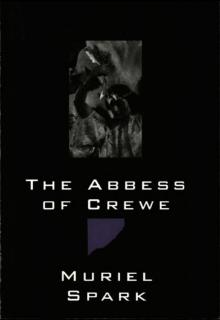 The Abbess of Crewe: A Modern Morality Tale
The Abbess of Crewe: A Modern Morality Tale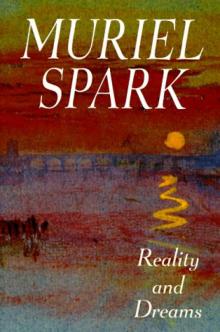 Reality and Dreams
Reality and Dreams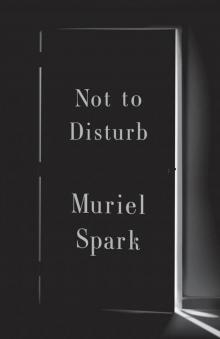 Not to Disturb
Not to Disturb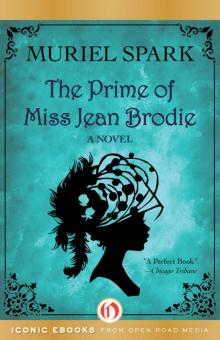 The Prime of Miss Jean Brodie
The Prime of Miss Jean Brodie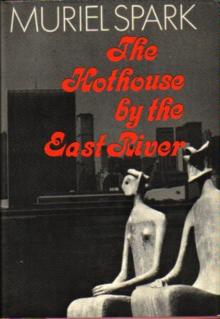 The Hothouse by the East River
The Hothouse by the East River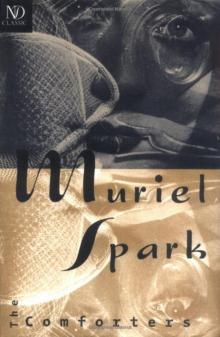 The Comforters
The Comforters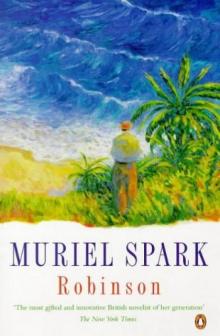 (1958) Robinson
(1958) Robinson Unknown
Unknown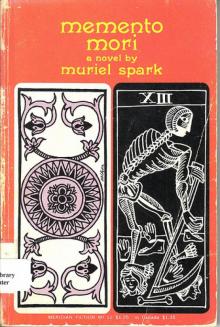 Memento Mori
Memento Mori The Finishing School
The Finishing School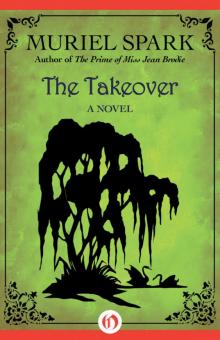 The Takeover
The Takeover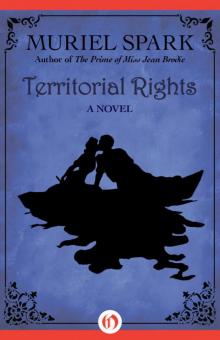 Territorial Rights
Territorial Rights The Complete Short Stories
The Complete Short Stories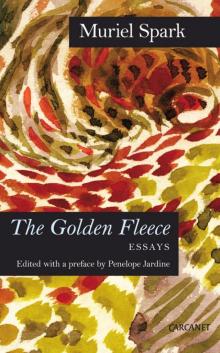 The Golden Fleece: Essays
The Golden Fleece: Essays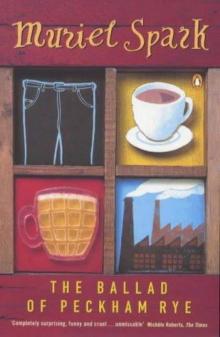 The Ballad of Peckham Rye
The Ballad of Peckham Rye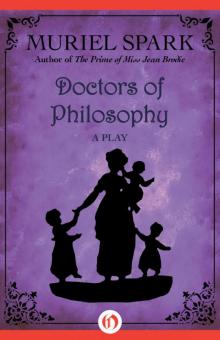 Doctors of Philosophy: A Play
Doctors of Philosophy: A Play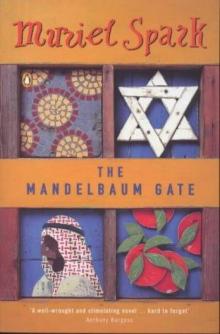 The Mandelbaum Gate
The Mandelbaum Gate Loitering With Intent
Loitering With Intent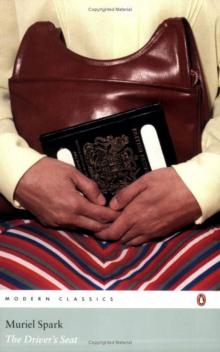 The Driver's Seat
The Driver's Seat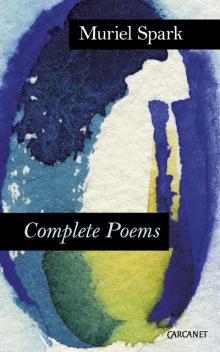 Complete Poems: Muriel Spark
Complete Poems: Muriel Spark Symposium
Symposium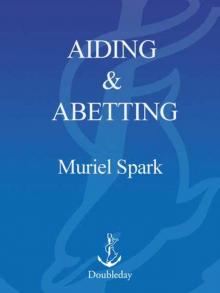 Aiding and Abetting
Aiding and Abetting The Golden Fleece
The Golden Fleece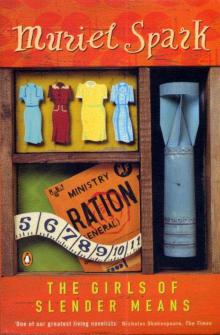 The Girls of Slender Means
The Girls of Slender Means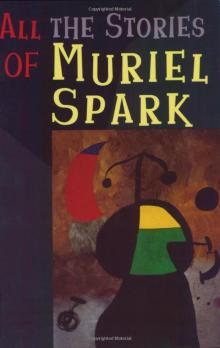 Alice Long’s Dachshunds
Alice Long’s Dachshunds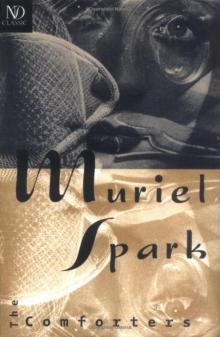 (1954) The Comforters
(1954) The Comforters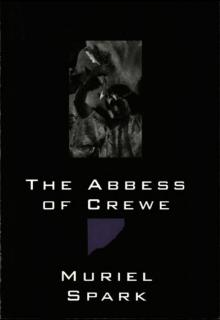 The Abbess of Crewe
The Abbess of Crewe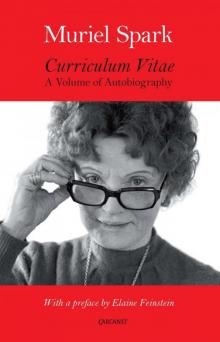 Curriculum Vitae
Curriculum Vitae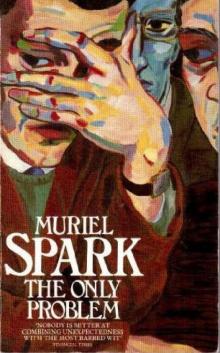 The Only Problem
The Only Problem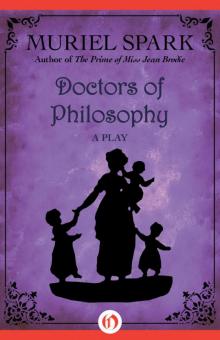 Doctors of Philosophy
Doctors of Philosophy